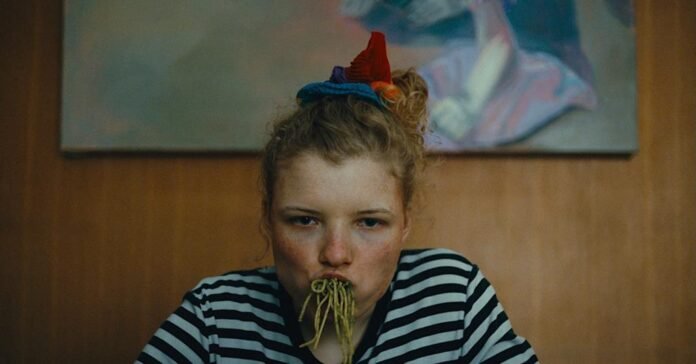Dir/scr: Florian Pochlatko. Austria. 2025. 102mins.
Psychological sickness is usually a tough factor to get proper in any artwork type. In his peppy debut characteristic, Florian Pochlatko grabs the nettle with a deal of panache by turning the travails of twenty-something psychiatric affected person Pia, engagingly performed by Luisa-Celine Garron, right into a sort of cinematic graphic novel that navigates a deft tonal journey by way of humour, melancholy, romance, edgy drama and a few trippy visible montages.
Navigates a deft tonal journey
The chance, in these instances, is to make psychological disaster cute – and it’s one which The way to be Regular, which bows in Berlin’s Views, doesn’t shrink back from. There’s fairly a young love story at its core, one that’s all about how addictive damaging relationships might be, and the way troublesome however needed it’s to finish them. And this brightly-coloured, self-consciously cool movie makes issues straightforward for its viewers by refusing to call Pia’s situation.
But when it’s just a bit an excessive amount of in love with itself at instances, this debut of a writer-director who studied underneath Michael Haneke can also be assured and unique. You need doom-laded TV information studies, bizarre amoeba montages, catastrophe film parodies, and a shrink who throughout a remedy session, for no obvious purpose, will get up and dances to Haddaway’s Nineties Eurodance hit ’What Is Love’? It’s all right here. There’s a in-built attraction for youthful audiences who will respect its multimedia strategy and Mitteleuropean Napoleon Dynamite vibe, and adventurous arthouse distributor can also be tempted.
What plot there’s centres on Pia’s episodic makes an attempt to slot in with the ‘regular’ world after she is discharged from a psychiatric clinic – not, we suspect, for the primary time. Quite a bit rests on the shoulders of an actress who’s in virtually each shot (the only a few scenes that stray from her viewpoint really feel like missteps). Garron rises to the problem with aplomb: her Pia is a life-force whose face positively glows when she is up, and appears like moist cement when she sinks right into a trough (although her most popular delusion is that it’s lined with a skinny slice of Gruyere cheese – and this being Pia’s world, she spends a good whereas strolling round with cheese on her face).
Not all of Pia’s paranoid visions are so unique: a recurrent one options CIA operatives straight out of Matrix central casting, suggesting maybe that each age creates its personal royalty-free photograph archive of delusions. Psychological well being within the age of social media is one other preoccupation: when Pia breaks right into a frenzied cry-for-help dance exterior a bar the place a good friend works, a lot of the purchasers attain for his or her cell phones and begin filming her.
If there’s an enormous message buried on this breezily disturbing and disturbingly breezy comedy-drama, it’s proper there within the title: how do you come back to normality when normality, at present, is so rattling bizarre? It doesn’t assist that Pia strikes again into the bed room she grew up in, or that her involved dad and mom are themselves doing jobs that might drive anybody batty. Mum Elfie (Elke Winkens) is a voice-over artist narrating Mondo-style TV documentaries about zombie snails and different freaks of nature, whereas dad Klaus (Cornelius Obonya) is an government in a printing firm whose total workers, himself included, is in denial a few takeover that can result in its sure demise. He finds Pia a job there as sustainability officer, a job that appears to contain limitless quantities of photocopying.
As an ethical, ‘in a mad world, possibly loopy is sane?’ verges on the facile, however The way to Be Regular pulls again from that conclusion in an ending that returns to the movie’s emotional baseline – sympathy for a younger girl who is aware of she is sick and desires to get higher.
Manufacturing firms: Golden Ladies Filmproduktion
Worldwide gross sales: Alpha Violet, information@alphaviolet.com
Producers: Arash T. Riahi, Sabine Gruber
Cinematography: Adrian Bidron
Manufacturing design: Julia Oberndorfinger, Attila Plangger
Enhancing: Julia Drack
Music: Rosa Anschutz
Predominant forged: Luisa-Celine Gaffron, Elke Winkens, Cornelius Obonya, Felix Pochhacker, Oliver Rosskopf, Lion Thomas Tatzber-Poms, David Scheid
